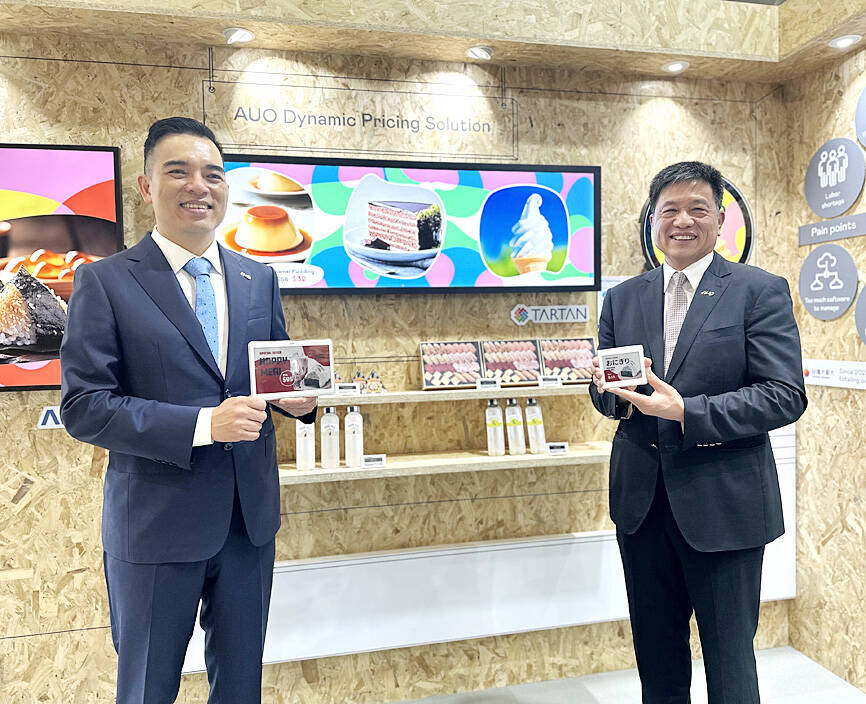Flat-panel display supplier AUO Corp’s (友達) losses last quarter narrowed to NT$3.53 billion (US$108.48 million) from NT$10.91 billion a year earlier, thanks to restocking demand from TV vendors in preparation for major global sports events such as the Paris Olympics and UEFA Euro 2024 in the second half of the year.
However, the Hsinchu-based company’s losses increased from NT$1.51 billion in the fourth quarter of last year. That translated into losses per share of NT$0.46 last quarter, an improvement from losses of NT$1.42 a year earlier, but worse than losses per share of NT$0.2 a quarter earlier.
Operating losses last quarter improved to NT$4.94 billion from NT$5.07 billion a quarter earlier and NT$11.14 billion a year earlier.

Photo: Chen Mei-ying, Taipei Times
“We maintain our outlook for this year. The first quarter was the bottom,” AUO chairman Paul Peng (彭?浪) told a virtual investors’ conference yesterday. “Businesses are returning to the normal seasonal cycles.”
AUO expects a gradual recovery each quarter for the remainder of the year, first thanks to a boost from TV vendors who last quarter began restocking for the high season, Peng said.
The introduction of artificial intelligence (AI) PCs from the middle of this year would fuel new growth momentum, he added.
As a result, shipments this quarter would increase by a low-to-mid-single-digit percentage sequentially, AUO said, adding that average selling prices would grow by a low-single-digit percentage quarter-on-quarter.
Aside from an improvement in its core flat-panel display business, AUO expects revenue from total solutions for automotive and other vertical industries to increase this quarter, following its acquisition of Behr-Hella Thermocontrol GmbH (BHTC), a German supplier of auto cockpit components, for 600 million euros (US$643.7 million).
Revenue from AUO’s non-display business, or the total solutions for vertical industries, would make up 20 percent of total revenue this quarter, Peng said.
In the long run, the firm aims to boost its revenue contribution from automotive solutions — mostly smart cockpits — to 25 percent, AUO chief executive Frank Ko (柯富仁) told investors.
Last year, automotive business made up about 17 percent of the company’s total revenue, it said.
Excluding BHTC, AUO expects its automotive business revenue to increase by a double-digit percentage to more than NT$50 billion this year from NT$44 billion last year, maintaining a similar pace of growth to what it has experienced since 2022, Ko said.
A greater revenue contribution from auto parts would be crucial for AUO to mitigate the volatility of its profitability caused by the boom-and-bust nature of the display industry, Ko said.
Auto components tend to have a longer order visibility and deliver stable profits, Ko said.
AUO said it is making good progress on commercializing its microLED technology, which is considered cost-efficient and should enable local display companies to compete with OLED technology, which is dominated by South Korean firms.
The company said it expects to see microLED displays used in large TVs and vehicle displays in the next two or three years.
AUO began shipping microLED displays for smart watches at the end of last year and expects volume to grow this year.

When an apartment comes up for rent in Germany’s big cities, hundreds of prospective tenants often queue down the street to view it, but the acute shortage of affordable housing is getting scant attention ahead of today’s snap general election. “Housing is one of the main problems for people, but nobody talks about it, nobody takes it seriously,” said Andreas Ibel, president of Build Europe, an association representing housing developers. Migration and the sluggish economy top the list of voters’ concerns, but analysts say housing policy fails to break through as returns on investment take time to register, making the

NOT TO WORRY: Some people are concerned funds might continue moving out of the country, but the central bank said financial account outflows are not unusual in Taiwan Taiwan’s outbound investments hit a new high last year due to investments made by contract chipmaker Taiwan Semiconductor Manufacturing Co (TSMC, 台積電) and other major manufacturers to boost global expansion, the central bank said on Thursday. The net increase in outbound investments last year reached a record US$21.05 billion, while the net increase in outbound investments by Taiwanese residents reached a record US$31.98 billion, central bank data showed. Chen Fei-wen (陳斐紋), deputy director of the central bank’s Department of Economic Research, said the increase was largely due to TSMC’s efforts to expand production in the US and Japan. Investments by Vanguard International

EARLY TALKS: Measures under consideration include convincing allies to match US curbs, further restricting exports of AI chips or GPUs, and blocking Chinese investments US President Donald Trump’s administration is sketching out tougher versions of US semiconductor curbs and pressuring key allies to escalate their restrictions on China’s chip industry, an early indication the new US president plans to expand efforts that began under former US president Joe Biden to limit Beijing’s technological prowess. Trump officials recently met with their Japanese and Dutch counterparts about restricting Tokyo Electron Ltd and ASML Holding NV engineers from maintaining semiconductor gear in China, people familiar with the matter said. The aim, which was also a priority for Biden, is to see key allies match China curbs the US

STRUGGLING TO SURVIVE: The group is proposing a consortium of investors, with Tesla as the largest backer, and possibly a minority investment by Hon Hai Precision Nissan Motor Co shares jumped after the Financial Times reported that a high-level Japanese group has drawn up plans to seek investment from Elon Musk’s Tesla Inc to aid the struggling automaker. The group believes the electric vehicle (EV) maker is interested in acquiring Nissan’s plants in the US, the newspaper reported, citing people it did not identify. The proposal envisions a consortium of investors, with Tesla as the largest backer, but also includes the possibility of a minority investment by Hon Hai Precision Industry Co (鴻海精密) to prevent a full takeover by the Apple supplier, the report said. The group is